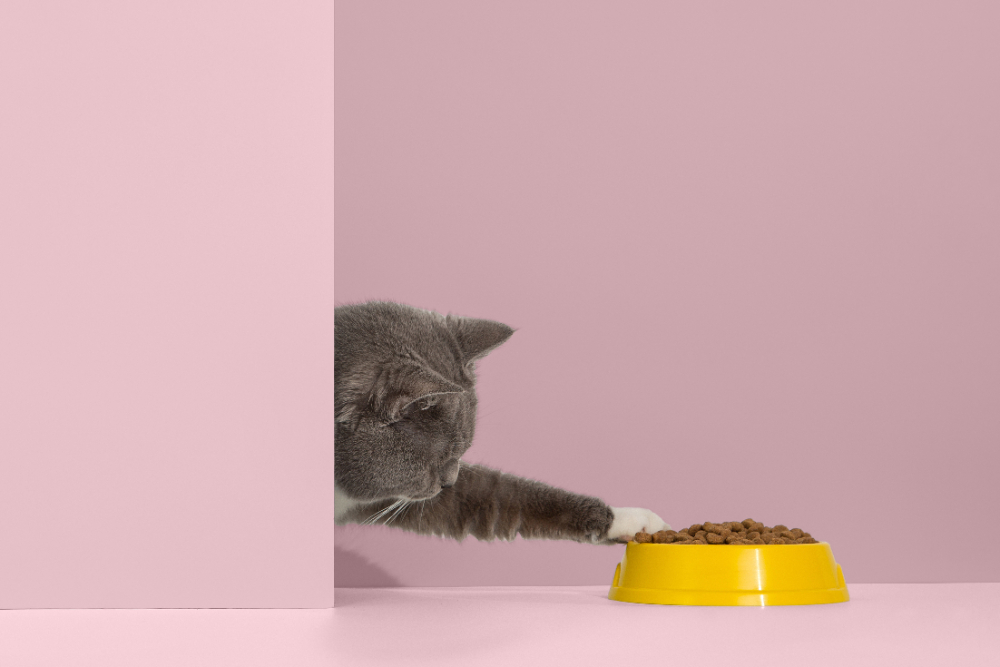What to feed your cat - how to take care of your pet's health?

Basic nutritional needs of the cat
When you think about what to give your cat, always remember that it is a carnivore by nature. This means that his diet should be based on zoonotic ingredients, because only they provide him with what he really needs. Protein is key - without it, your cat's body won't function properly. It supports muscles, tissue regeneration and overall fitness, so it's an absolute must on his daily menu.
Don't forget taurine - that magical substance that cats can't produce on their own. Its absence can lead to serious problems with the heart, eyesight or nervous system. It is also worth remembering the healthy fats that are responsible for a beautiful coat and healthy skin. And when it comes to water - cats are not always willing to drink a lot, so it is up to us to ensure that they always have access to fresh water.
Types of cat food
Walking into a pet store, you may feel overwhelmed by the number of options. Whether to choose dry food? It is convenient, easy to store, and the price is often lower. But keep in mind that it has one major drawback - it is devoid of water, which can be problematic for cats, especially if they don't drink enough of it.
Wet food? It's a great option for cats who have hydration problems or simply prefer a juicier food. It is closer to the natural diet and better suits their needs, although it actually costs a little more and spoils faster.
How about the BARF diet? Raw meat and bones seem the most natural choice, but preparing such a diet requires knowledge and precision. You can't give your cat just anything - you need to know the proportions of ingredients that will give it all the nutrients it needs.
Don't forget specialty foods that are formulated for cats with specific health problems, such as allergies, overweight or kidney disease. If your cat needs something extra, such foods can be a hit.
The most common mistakes in feeding a cat
Many cat owners, wanting the best for their cats, make some mistakes. One of them is to feed only dry food, especially if the cat has limited access to water. In the long run, this can lead to kidney problems.
Another common mistake is sharing human food with the cat. Remember that not everything that tastes good to us is safe for animals. Products such as onions, garlic, chocolate or even milk can be harmful to your cat.
Also, do not forget to adjust the diet to the age of the cat. Kittens need completely different ingredients than adult cats or seniors. Overfeeding? It's also a problem I see often-obesity is unfortunately a disease that can significantly shorten your furry's life.
How to choose the best food for your cat?
Before you put something in your cart, check the composition of the food. The first ingredient? Meat. If you see grains or other fillers at the top of the list, put that food back on the shelf. Cats need a diet rich in protein, not carbohydrates, which they do not need.
Avoid products full of artificial additives or preservatives. If you're not sure what's best, talk to your vet - he or she can help you choose a food that fits your cat's needs. And most important: watch your pet. His behavior, coat condition or digestion will tell you whether the food serves him.
Frequency and method of feeding
Every cat is different, but usually adult cats only need 2-3 meals a day. However, some cats prefer to snack throughout the day, in which case you can leave food in their bowl, but make sure not to overdo the amount.
If your cat eats dry food, make sure it always has access to fresh water. Some cats love water fountains that encourage them to drink. Remember that proper hydration is the key to a healthy urinary tract.
Special dietary needs
Your cat is unique and its diet should meet its needs. Kittens have a huge appetite and need more calories to grow healthily. Older cats, on the other hand, often require foods that support their joints or kidneys.
If your cat has health problems such as being overweight, allergies or urinary tract diseases, a specialized food may be necessary. In such cases, it is always a good idea to consult a veterinarian, who will help choose the right diet.
Frequently asked questions about feeding your cat
- Can a cat eat only wet food?
Yes, maybe. Wet food is rich in water and often better suits a cat's natural needs. It is important that it is of good quality and properly balanced.
- Does your cat need supplements?
It depends. If you feed your cat a high-quality whole food, supplements are not necessary. However, with a BARF diet or homemade food, it is a good idea to supplement the diet with vitamins and minerals.
- How to introduce a new food?
Gradually. Mix the new food with your existing food, increasing the amount over several days. This will make it easier for your cat to accept the change, and you will avoid problems with its stomach.
By taking care of what your cat eats, you take care of its health and happiness. After all, what goes into his bowl has a huge impact on how he feels every day.




